
Wat Ong Teu Mahawihan is located along Setthatirat Road within the tourist belt.
Most backpackers arriving in Vientiane using the local 'songtheaw' or 'tuk-tuk' will definitely be drop off in front of the temple where most of the hotels,guesthouses,bars,cybercafes,Mekong River or even the small little Chinatown is just a short walking distance from here.
Wat Ong Teu is surrounded by four other temples : Wat Inpeng to the north, Wat Mixay to the south, Wat Haysok to the east, and Wat Chan to the west.
Wat Ong Teu Mahawihan (Temple of the Heavy Buddha) is one of the most important temple in Laos. Famous for its beautifully carved wooden facade, the temple was built in the early 16th century by King Setthathirat, but like almost every other temple in Vientiane it was destroyed in later wars with the Siamese.
The temple was rebuilt in the 19th and 20th centuries. Home to the Patriarch of Lao Buddhism, the temple also serves as a national center for Buddhist studies.

Most of the monks came to this Buddhist Institute to enhance their studies.
Jade statue of the Great Warrior,King Setthatirat I. (1534-1572)
Also known as King Chaichetta in Thai,the king has his origin from the Lanna Kingdom in Chiangmai,Thailand.
Supposed to be the King of Lanna,he jumpship and returned to Lang Xang and became king taking with him the Emerald Buddha.
The reason mainly due the danger posed by the Burmese invasion of Chiangmai in 1558.
King Rama I took back the Emerald Buddha and placed it at Wat Phra Kaeo(Temple of Emerald Buddha) in Bangkok two years later.
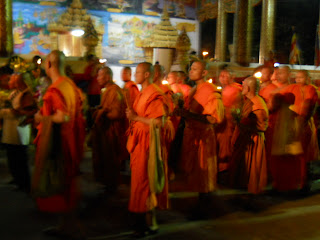
The first week of November is the grand That Luang Festival in Vientiane and Wat Ong Teu is also one of the many locations which also commemorates the event.
Leading the temple's procession were the monks.
It was a glittering night at the temple which otherwise will be closed at night on normal days.

The Lao people young and old came in droves and nearly filled the whole temple compound.
The situation was quite comparable to the Loy Krathong festival in Bangkok which has the most tourists but not here at the moment.
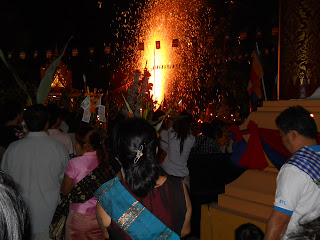
Adding to the festivities were the fireworks display.

The Lao ladies began the night with 'lam vong' folk dance.
'Lam Vong' is the national dance of Laos in which the men will formed the inner circle while the ladies will dance in the outer circle.
In Cambodia this dance is known as 'ramvong' and the most popular social dances.
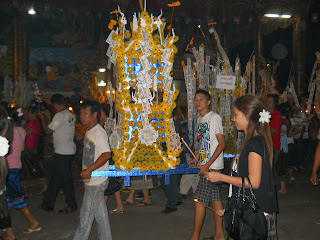
Devotees carrying a paper crafted sedan chair decorated with yellow honey flowers and the real Lao Kips bills were also pin on it to be made as offerings to the temple.
The more money ones stick on the sedan chair,the more properous will be to the business.
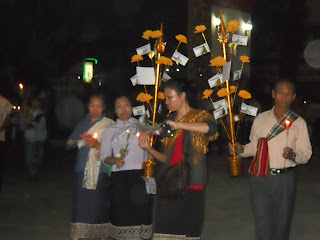
It was a night of candlelit procession.

Devotees parading around the temple three times in the belief this will bring good luck and strength.
Heavily decorated with Lao kips which will eventually be donated to the temple.
The band came marching in with some latest techno music.
Festival like this is the best opportunity the mix with the Lao people and understand their culture.

Devotees converging inside the temple after the procession to pray the almighty Lord Buddha.
It was a very huge crowd turnout even the outside of the temple's pavement has to be occupied by the devotees.
Devotees praying outside the temple's compound. Buddhism is the primary religion of Laos.
Lao Buddhism is a unique version of Theravada Buddhism and is at the basis of Lao culture.
Buddhism in Laos is often closely tied to animist beliefs and belief in ancestral spirits, particularly in rural areas.
Buddhist flag alongside the Lao National flag.

The huge Ong Teu bronze Buddha inside the temple's 'sim' flanked by two smaller Buddhas.
'Sim' refers to the main building where the statue of Buddha is located.
Lao dancers wearing black clothings are the Lao-Lum people that formed the largest ethnic group in Laos.
The lowland Lao-Lum ethnic group parading in the procession.
View inside the temple's prayer hall.
Statue of Phra Ong Teu.
Playing the samba music.
A small Pha That Luang shrine.
That Luang festival is also known as the 'Full Moon Festival' while in Thailand it is known as the Loy Krathong.
Whereas the Full Moon Party held throughout the year is a different version can be experienced in the islands of Koh Samui and Koh Phangan off the coast of Surathani Province in Southern Thailand.









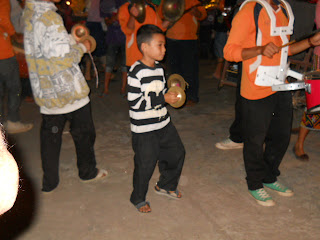




















 Wat Ong Teu Mahawihan is located along Setthatirat Road within the tourist belt.
Wat Ong Teu Mahawihan is located along Setthatirat Road within the tourist belt.








